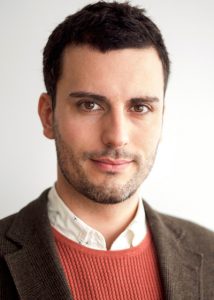EMS Tromp Award 2019 for Diego Miralles

Award for an outstanding achievement in biometeorology
The EMS Tromp Award for an outstanding contribution in biometeorology 2019 will be presented to Diego G. Miralles, Associate Professor in Hydrology and Climate at the Faculty of Bioscience Engineering of Ghent University (Belgium).
He was nominated with the paper: “Land–atmospheric feedbacks during droughts and heatwaves: state of the science and current challenges”, D.G. Miralles, P. Gentine, S.I. Seneviratne, and A. J. Teuling., published in April 2019 in Ann.N.Y. Acad.Sci., 1436, 19-35, DOI 10.1111/nyas.19312, 2019.
The prize will be presented during the EMS Annual Meeting 2019 on 10 September 2019 in Copenhagen, Denmark. The awardee will receive $US 1,000 and travel expenses to attend the EMS Annual Meeting.
Diego Miralles will give the award presentation on Tuesday, 10 September 2019 in session OSA2.2 Agricultural meteorology:
Biography
Diego graduated in Environmental Sciences from Autonomous University of Madrid (UAM, 2005) and in Hydrology from Vrije University Amsterdam (VUA, 2009). He completed a PhD in Ecohydrology at the same university (VUA, 2011). In 2009 he joined the Hydrology and Remote Sensing Laboratory of the USA Department of Agriculture (USDA, Washington D.C.).
Diego’s earlier research focused on satellite retrievals of soil moisture and the work on land–atmosphere fluxes that would result in his PhD thesis, ‘Evaporation in the Global Water Cycle: Analysing Land Evaporation Using Satellite Observations’. This work embraced the challenge to develop GLEAM, a global retrieval model of terrestrial evaporation solely based on satellite data. Since then, GLEAM has been used in hundreds of applications, ranging from agricultural studies to climate model benchmarking.
In 2011, Diego moved to a faculty position as Assistant Professor (Lecturer) at the University of Bristol (UK).
- For more information on Diego Miralles’ CV
- More information about his scientific research and research team can be found on his website .
The Tromp Foundation (Foundation for Biometeorological Research), the legacy of Solco W. Tromp, is funding this award with the intention to promote biometeorology in Europe. Biometeorology is an interdisciplinary science studying the interactions between atmospheric processes and living organisms – plants, animals and humans. It provides answers to the question How does weather and climate impact the well-being of all living beings?
![]()
EMS Tromp Young Scientist Travel Awards
The Tromp Foundation also funds five Tromp Foundation travel awards for young scientists (TFTAYS) for papers that are presented at the EMS Annual Meeting specifically on topics in biometeorology. The following recipients who will all give presentations in Session OSA2.4 Atmospheric effects on humans, have been selected:
- Andre Santos Nouri, Portugal
An appraisal into the interdisciplinary integration of thermo-physiological aspects in local urban design and decision making in an era of climate change - Mohammad Taleghani, United Kingdom
The impact of land cover on pedestrians’ thermal comfort within a university campus - Dragan Milošević, Serbia
Quantification of temporal changes of urban heat island intensity and cooling and heating rates in different local climate zones of mid-sized central European city - Moshe Mandelmilch, Israel
Analysis of the Urban Heat Island magnitude in the Desert City of Beer-Sheva, Israel, Using a Modified Local Climate Zone Classification - Pavel Konstantinov, Russian Federation
Boundary layer inversions and human thermal comfort in Arctic cities (based on UHIARC measurements)
Who was Solco Walle Tromp?
Solco W. Tromp was born on March 1909. He studied geology and geography at Leyden University, The Netherlands, and after he received his PhD he worked as an exploration geologist for oil companies. During World War II he became involved in de Dutch section of MacArthur’s Headquarters. After the war, he studied physiology and meteorology; in 1947 he became a Professor of Geology at the King Saud University in Cairo, Egypt; from 1950 to 1955 he was a geological consultant at the UN Technical Assistance programme for Central America and the Middle east.
In 1955, he switched to biometeorology and founded the Biometeorological Research centre in Leyden. In the same year he founded the International Society for Biometeorology of which he was secretary until 1976. Solco Tromp combined three distinct qualities, a highly scientific mind, a logical intellect and an excellent organisational talent. By 1953, he already achieved a substantial bibliography on topics, which we may refer to as biomedical science or medical geography. His remarkable productive energy continued to the time of his death in 1993.
As a person, Solco Tromp was very courteous, full of humour and with a great zest for life. He became the main promoter of biometeorology for many years after his geology career. After he died part of his legacy was allocated to The Tromp Foundation (Foundation for Biometeorological Research). The aim of the Foundation is to promote Biometeorology.



Kommentare sind geschlossen.